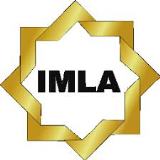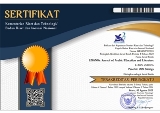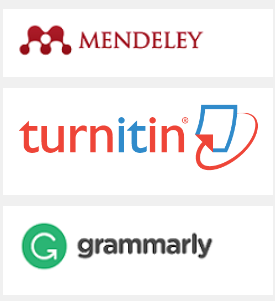The Role of ChatGPT in Enhancing Academic Arabic Writing Skills among Students of Arabic Language Education
DOI:
https://doi.org/10.18326/lisania.v9i1.152-173Keywords:
Artificial Intelligence, ChatGPT, Academic Writing Skills, Arabic Language Education ProgramAbstract
This research examines the role of Artificial Intelligence (AI) ChatGPT in improving the Arabic academic writing skills of students in the Arabic Language Education program at STIT Darul Hijrah Martapura. The goals are to describe (1) how ChatGPT helps students in writing Arabic, (2) the accuracy and relevance of its suggestions in academic writing, and (3) the challenges students face when using ChatGPT for Arabic academic writing. This field study uses a quasi-qualitative method, with data collected through interviews, observation, and documentation. Data analysis is conducted using the Miles and Huberman method. The results of the study showed that 1) 95% of sixth-semester students in the Arabic Language Education Program at STIT Darul Hijrah Martapura used ChatGPT for writing Arabic thesis proposals. ChatGPT helped them generate ideas, translate, and find references. Techniques included asking questions in Arabic, using Indonesian with commands to produce Arabic text, and translating. 2) The accuracy of ChatGPT varied: direct Arabic questions gave more relevant answers, while Indonesian commands were less precise. 3) Challenges included accuracy, cultural context, source verification, and plagiarism concerns, with some students resolving these by cross-checking with dictionaries and online sources.
References
Abicandra, M. N. H., & Maturdey, F. (2023). Chat GPT لعمل البحث العلمي: دراسة وصفية عن خبرات الطلبة والمحاضر في قسم تعليم اللغة العربية عنها. Mahrajan Arabi: Prosiding International Conference in Arabic Festival (INCAFA), 3(1), Article 1.
Abidah, N. K. K., Hikmawati, R., & Erawanto, V. (2024). ChatGPT in Indonesia-Arabic Translation: A Quality Analysis. Al-Arabi: Jurnal Bahasa Arab Dan Pengajarannya = Al-Arabi: Journal of Teaching Arabic as a Foreign Language, 8(1), Article 1. https://doi.org/10.17977/um056v8i1p33-52
Adamopoulou, E., & Moussiades, L. (2020). An Overview of Chatbot Technology. Dalam I. Maglogiannis, L. Iliadis, & E. Pimenidis (Ed.), Artificial Intelligence Applications and Innovations (hlm. 373–383). Springer International Publishing. https://doi.org/10.1007/978-3-030-49186-4_31
Akkaya, A., & Aydin, G. (2018). Academics’ Views on the Characteristics of Academic Writing. Educational Policy Analysis and Strategic Research, 13(2), 128–160.
Al-Huri, I. (2015). Arabic Language: Historic and Sociolinguistic Characteristics. English Literature and Language Review, 1(4), 28–36.
Alwasidi, M. A., & Al-Khalifah, K. S. (2025). Assessing the Impact of ChatGPT on EFL Students’ Writing Productivity and Proficiency. Journal of Language Teaching and Research, 16(3), Article 3. https://doi.org/10.17507/jltr.1603.29
Belbouah, A., Khotbi, T., & Bouguerba, T. (2023). Challenges of Writing in Arabic as a Foreign Language Context: Case of the Spanish School in Rabat. European Journal of Contemporary Education and E-Learning, 1, 3–19. https://doi.org/10.59324/ejceel.2023.1(1).01
Berliani, D., Azhari, I., & Taufiqurrochman, R. (2024). EXPLORING THE POTENTIAL OF CHATGPT AS A TECHNOLOGY-BASED TOOL FOR ARABIC LANGUAGE LEARNING: BENEFITS AND RISKS. Kitaba, 2(2), Article 2. https://doi.org/10.18860/kitaba.v2i2.25166
Brantasari, M. (2022). WORKSHOP ACADEMIC WRITING UNTUK MENINGKATKAN REGULASI DIRI DALAM BELAJAR: WORKSHOP ACADEMIC WRITING UNTUK MENINGKATKAN REGULASI DIRI DALAM BELAJAR. Jurnal Pengabdian Kreativitas Pendidikan Mahakam (JPKPM), 2(1), Article 1. https://doi.org/10.24903/jpkpm.v2i1.859
Chen, L., Chen, P., & Lin, Z. (2020). Artificial Intelligence in Education: A Review. IEEE Access, 8, 75264–75278. IEEE Access. https://doi.org/10.1109/ACCESS.2020.2988510
Creswell, J. W. (2013). Qualitative inquiry and research design: Choosing among five approaches (3rd ed). SAGE Publications.
Creswell, J. W., & Creswell, J. D. (2017). Research Design: Qualitative, Quantitative, and Mixed Methods Approaches. SAGE Publications.
Dashtipour, K., Poria, S., Hussain, A., Cambria, E., Hawalah, A. Y. A., Gelbukh, A., & Zhou, Q. (2016). Multilingual Sentiment Analysis: State of the Art and Independent Comparison of Techniques. Cognitive Computation, 8, 757–771. https://doi.org/10.1007/s12559-016-9415-7
Deni̇z, K., & Karagöl, E. (2017). Akademik Yazma Açısından Makale Hakem Değerlendirme Formları. Journal of Turkish Studies, 12(Volume 12 Issue 34), Article Volume 12 Issue 34. https://doi.org/10.7827/TurkishStudies.12632
Dewanto, A. C. (2023). RESIKO DAN MITIGASI PENGGUNAAN KECERDASAN BUATAN DALAM BIDANG PENDIDIKAN. Prosiding Konferensi Ilmiah Pendidikan, 4, 1–10.
Ertel, W. (2018). Introduction to Artificial Intelligence. Springer.
Fahmi, N. (2023). Problems of Writing Arabic Related to Changes in Arabic Syntax and Morphology. International Journal of Language and Teaching, 1(1), Article 1. https://doi.org/10.61231/ijlt.v1i1.49
Faris, H., & Abdurrahman, M. (2023). ANALISIS PENERJEMAHAN BAHASA ARAB KE BAHASA INDONESIA MELALUI ARTIFICIAL INTELLIGENCE CHAT GPT. Al-Af’idah Jurnal Pendidikan Dan Pengajaran Bahasa Arab, 7(2), Article 2. https://doi.org/10.52266/al-afidah.v7i2.1967
Fatoni, P., Ferdinand, I., Sajidin, F., Jaja, J., & Kurnia, M. D. (2024). Pemanfaatan Teknologi AI dan Chat GPT dalam Penulisan Artikel Mahasiswa. Jubah Raja : Jurnal Bahasa, Sastra, Dan Pengajaran, 3(1), Article 1. https://doi.org/10.30734/jr.v3i1.4150
Freire, Y., Laorden, A. S., Pérez, J. O., Collado, I. O., Sánchez, M. G., Vasallo, I. J. T., García, V. D.-F., & Suárez, A. (2025). Evaluating the influence of prompt formulation on the reliability and repeatability of ChatGPT in implant-supported prostheses. PLOS ONE, 20(5), e0323086. https://doi.org/10.1371/journal.pone.0323086
Gabsi, Z. (2020). Writing in Arabic as a Foreign Language (AFL): Towards Finding a Balance between Translation Dependency and Creative Writing. Journal of Language Teaching and Research, 11(4), 532. https://doi.org/10.17507/jltr.1104.02
Ghufron, M. A. (2015). ENHANCING STUDENTS’ ACADEMIC WRITING SKILL BY USING RESEARCH PAPER WRITING INSTRUCTIONAL MATERIALS. Lensa: Kajian Kebahasaan, Kesusastraan, Dan Budaya, 5(2), Article 2.
Hakim, M. bin A. (2018). Improving Arabic Academic Writing Skills Through Contextual Teaching And Learning Approach. ALSINATUNA, 3, 183. https://doi.org/10.28918/alsinatuna.v3i2.1169
IKHSAN ROSADI, N. 06420020. (2014). PROBLEMATIKA PENULISAN SKRIPSI BERBAHASA ARAB JURUSAN PENDIDIKAN BAHASA ARAB UNIVERSITAS ISLAM NEGERI SUNAN KALIJAGA (TAHUN AJARAN 2009-2012) [Skripsi, UIN SUNAN KALIJAGA]. https://digilib.uin-suka.ac.id/id/eprint/11081/
Kholis, M. N., & Nadhif, M. F. (2023). The Effectiveness of Quizlet.com in Arabic Vocabulary Learning; Students’ Perception and Acceptance of Technology. LISANIA: Journal of Arabic Education and Literature, 7(1), Article 1. https://doi.org/10.18326/lisania.v7i1.1-13
Lim, W. M. (2025). What Is Qualitative Research? An Overview and Guidelines. Australasian Marketing Journal, 33(2), 199–229. https://doi.org/10.1177/14413582241264619
Liu, C., Bao, X., Zhang, H., Zhang, N., Hu, H., Zhang, X., & Yan, M. (2023). Improving ChatGPT Prompt for Code Generation. https://doi.org/10.48550/arXiv.2305.08360
Lokman, A. S., & Ameedeen, M. A. (2019). Modern Chatbot Systems: A Technical Review. Dalam K. Arai, R. Bhatia, & S. Kapoor (Ed.), Proceedings of the Future Technologies Conference (FTC) 2018 (hlm. 1012–1023). Springer International Publishing.
Mahbubah, L., Sutaman, S., & Syuhadak, S. (2021). Strategy for Writing Scientific Research among Students in Department of Arabic. Izdihar : Journal of Arabic Language Teaching, Linguistics, and Literature, 4(1), Article 1. https://doi.org/10.22219/jiz.v4i1.15840
Meihan, A., Sinurat, J., & Rukmana, L. (2023). ANALISIS PEMANFAATAN CHATGPT DALAM PEMBELAJARAN SEJARAH OLEH MAHASISWA PROGAM STUDI PENDIDIKAN SEJARAH UNIVERSITAS JAMBI. Jurnal Pendidikan Sejarah Indonesia, 6, 348. https://doi.org/10.17977/um0330v6i2p348-357
Miles, M. B., Huberman, A. M., & Saldana, J. (2014). Qualitative Data Analysis. SAGE.
Mujahidin, E. (2019). Model pembelajaran pengembangan kemampuan penulisan karya ilmiah bagi mahasiswa. Ta’dibuna: Jurnal Pendidikan Islam, 8(2), Article 2. https://doi.org/10.32832/tadibuna.v8i2.2644
Nita, S., Sari, E. R. N., & Aldida, J. D. (2023). IMPLEMENTASI CHATGPT-OPENAI SEBAGAI INOVASI MEDIA PEMBELAJARAN BERBASIS ARTIFICIAL INTELLIGENCE BAGI TENAGA PENDIDIK DI ERA SOCIETY 5.0. Prosiding Seminar Nasional Amikom Surakarta, 69–80.
Oueslati, O., Cambria, E., HajHmida, M. B., & Ounelli, H. (2020). A review of sentiment analysis research in Arabic language. Future Generation Computer Systems, 112, 408–430. https://doi.org/10.1016/j.future.2020.05.034
Patty, J., & Que, S. R. (2023). PEMANFAATAN ARTIFICIAL INTELLIGENCE (AI) DALAM PENULISAN ARTIKEL ILMIAH. Community Development Journal : Jurnal Pengabdian Masyarakat, 4(4), Article 4. https://doi.org/10.31004/cdj.v4i4.20437
Pontjowulan, P. (2023). Implementasi Penggunaan Media ChatGPT dalam Pembelajaran Era Digital. Educationist: Journal of Educational and Cultural Studies, 2(2), Article 2.
Putri, S. T. K., Wijoyo, S. H., & Putra, W. H. N. (2024). Analisis Perbandingan Terhadap Keputusan Pemilihan Penggunaan Aplikasi ChatGPT Dan Perplexity AI (Studi Kasus: Universitas Brawijaya). Jurnal Pengembangan Teknologi Informasi dan Ilmu Komputer, 8(7), Article 7. https://j-ptiik.ub.ac.id/index.php/j-ptiik/article/view/13920
Risnina, N. N., Permatasari, S. T. I., Nurulhusna, A. Z., Anjelita, F. M., Wulaningtyas, C., & Rakhmawati, N. A. (2023). Pengaruh ChatGPT Terhadap Proses Pembelajaran Mahasiswa di Institut Teknologi Sepuluh Nopember. Jurnal Pendidikan, Bahasa Dan Budaya, 2(4), 119–132. https://doi.org/10.55606/jpbb.v2i4.2364
Robbani, A. S., Atmantika, Z. H., & Bhavani, S. G. A. E. (2023). The Use of ChatGPT among Arabic Language and Literature Students: Opportunities and Challenges. Insyirah: Jurnal Ilmu Bahasa Arab Dan Studi Islam, 6(2), Article 2. https://doi.org/10.26555/insyirah.v6i2.9440
Rohmawaty, E. N., Hilmi, D., Uqba, M. S. S., & Saleh, U. S. (2024). Peran Artificial Intelligence (AI) dalam Pembelajaran Bahasa Arab Mahasiswa Pascasarjana UIN Maulana Malik Ibrahim Malang. Khatulistiwa: Jurnal Pendidikan Dan Sosial Humaniora, 4(3), 316–328. https://doi.org/10.55606/khatulistiwa.v4i3.4023
Russell, S. J., Norvig, P., & Davis, E. (2010). Artificial intelligence: A modern approach (3rd ed). Prentice Hall.
Sulaeman, I., Syuhadak, S., & Sulaeman, I. (2023). ChatGPT as a New Frontier in Arabic Education Technology. Al-Arabi: Jurnal Bahasa Arab Dan Pengajarannya = Al-Arabi: Journal of Teaching Arabic as a Foreign Language, 7(1), Article 1. https://doi.org/10.17977/um056v7i1p83-105
Suparno, D., Azwar, M., Al-Rawafi, A., Rokhim, M., Angga, N., & Chairul, A. I. (2022). Modern Standard Arabic and Yemeni Arabic Cognate: A Contrastive Study. Langkawi, 8(2). http://dx.doi.org/10.31332/lkw.v0i0.4240
Syafrina, R., & Khotimah, N. (2022). Efektivitas Workshop Academic Writing Untuk Meningkatkan Academic Self-Efficacy Pada Mahasiswa Semester Akhir. IDEA: Jurnal Psikologi, 6(1), 29–36. https://doi.org/10.32492/idea.v6i1.6103
Vaghasiya, K. (2024, Juni 5). ChatGPT Statistics: Rapid Growth from Launch to 2023-2024. Best Social Proof & FOMO App for Your Website | WiserNotify. https://wisernotify.com/blog/chatgpt-users/
Versteegh, C. H. M. (1997). The Arabic Language. Columbia University Press.
Wen, J., & Wang, W. (2023). The future of ChatGPT in academic research and publishing: A commentary for clinical and translational medicine. Clinical and Translational Medicine, 13(3), e1207. https://doi.org/10.1002/ctm2.1207
Wright, W. (2022). A Grammar of the Arabic Language: Vol. I. BoD – Books on Demand.
Yusuf, K. (2023). Bringing ChatGPT into Arabic Language Learning. Proceedings of International Conference on Islamic Civilization and Humanities, 1, 471–478.
Zulaeha, Z. (2022). Writing Composition Problem in Arabic Language Learning Among Arabic Language Education Students. Langkawi: Journal of The Association for Arabic and English, 0, 72–82. https://doi.org/10.31332/lkw.v0i0.3399
Downloads
Published
Issue
Section
License
Copyright (c) 2025 Rafiatun Najah Qomariah, Awad, Shofil Fikri, Shofia Lazreque

This work is licensed under a Creative Commons Attribution-NonCommercial-ShareAlike 4.0 International License.






